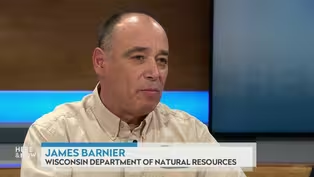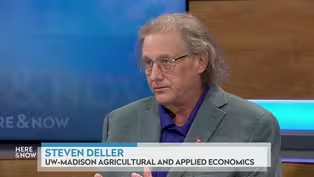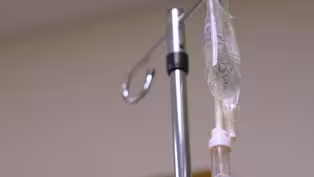Here and Now
Dr. James Conway On Wisconsin's Risks of Measles Outbreaks
Clip: Season 2400 Episode 2405 | 5m 2sVideo has Closed Captions
Dr. James Conway on a measles outbreak in Oconto County and a low state vaccination rate.
University of Wisconsin School of Medicine and Public Health pediatric infectious disease specialist Dr. James Conway considers a measles outbreak in Oconto County and the low state vaccination rate.
Problems playing video? | Closed Captioning Feedback
Problems playing video? | Closed Captioning Feedback
Here and Now is a local public television program presented by PBS Wisconsin
Here and Now
Dr. James Conway On Wisconsin's Risks of Measles Outbreaks
Clip: Season 2400 Episode 2405 | 5m 2sVideo has Closed Captions
University of Wisconsin School of Medicine and Public Health pediatric infectious disease specialist Dr. James Conway considers a measles outbreak in Oconto County and the low state vaccination rate.
Problems playing video? | Closed Captioning Feedback
How to Watch Here and Now
Here and Now is available to stream on pbs.org and the free PBS App, available on iPhone, Apple TV, Android TV, Android smartphones, Amazon Fire TV, Amazon Fire Tablet, Roku, Samsung Smart TV, and Vizio.
Providing Support for PBS.org
Learn Moreabout PBS online sponsorship>> James Barnier, thanks very much for joining us.
>> Thank you.
>> Measles was declared eliminated in the U.S. 25 years ago, but this year marks the most cases since then, with spread of the disease to 40 states and more than 1300 cases.
Earlier this month, Wisconsin reported nine cases in Oconto County.
But health officials say they believe any spread there is contained.
Still, Wisconsin kindergartners have one of the nation's lowest vaccination rates against measles, with less than 85% of them up to date on the measles vaccine.
Last year.
That's compared to about 92.5% of kindergartners nationwide, according to the CDC.
We turn to Doctor James Conway, pediatric infectious disease specialist at the UW School of Medicine and Public Health.
And thanks for being here.
>> Happy to be back.
>> So with Wisconsin vaccination rates, how at risk are we for measles outbreaks?
a sitting duck.
You know, as we see people traveling and introducing the disease into various areas, all it takes is one person who's incubating the disease to show up in an area with under-immunized populations.
In a way, it goes.
That's really how these things get started.
>> Are you surprised that we haven't seen that kind of outbreak?
surprising given our low rates and how much travel people have been doing as we've come out of Covid and gotten back to more normal activity.
You know, we know that disease gets introduced fairly regularly.
You know, while many of them are related to the Texas outbreak, we still see cases countries.
And so all it takes is one person showing up in the right place at the right time.
>> Now, I understand that Wisconsin is one of only 13 states that has a personal conviction waiver for parents to opt out of the vaccine.
Is that opt out on the rise?
>> Yeah, it's been debated.
You know, there are medical waivers in every state, and some states also have religious waivers.
But this personal exemption waiver is something that's a little unusual.
And it really allows people that just have a deep held personal conviction to opt out of it.
Some states are discussing actually allowing more of that while other states are shutting it down and actually trying to contain that activity.
>> So what's it like for a doctor like yourself to see a preventable disease like this spreading?
>> Yeah.
It's heartbreaking.
I mean, I saw plenty of measles earlier in my career, both in my training here in the United States and in my work globally.
And, you know, as we worked so hard to eradicate polio when I was younger, measles was really the next one on the chopping block.
And in the 90s, we were very optimistic.
We were getting closer.
You know, I've seen so many children suffer with this disease.
Adults don't do well with it either.
And then having to see people unfortunately subjected to this again, you know, it's really both preventable.
And just so unfortunate.
>> How transmissible are measles?
>> Measles is probably one of the most transmissible things on the planet.
You know, we talk about the fact that you probably need about 95% of people to be vaccinated in any community to keep an outbreak from spreading.
And so when we're sitting well below 90%, you know, it's really almost something that is inevitable.
But it is by far one of the most contagious things on this planet at this point.
kind of the symptoms of, of measles, but it can be fatal.
1 to 2 people per thousand are going to be killed by this.
Probably 10% get hospitalized.
So it is, you know, really a very high risk disease, especially in young kids, the elderly, people with compromised immune systems.
But even people that survive it.
I mean, it's a miserable disease.
>> And there are certain groups that cannot get a vaccine.
And any spread would put those people at risk who who really does not get the vaccine.
>> Yeah.
So this is one of the few vaccines that's still considered a live viral vaccine.
So these are viruses that have been essentially engineered to be less transmissible, but they still can cause some symptoms in people that don't have a good immune system.
So people that have had bone marrow or other organ transplants shouldn't be getting these vaccines.
Patients that are under chemotherapy for other types of cancers, people that are on immune compromising drugs, they just can't get the vaccines.
And so they really do depend on the rest of us to essentially build a firewall for them.
>> Now, I learned that in Milwaukee, the vaccination 75%.
They are now giving out 800 doses of this vaccine.
But how at risk is a place like Milwaukee?
>> Yeah, so that's exactly the worst nightmare.
Because, you know, one of the things we need to remember about measles is people are contagious before they have symptoms.
So 3 or 4 days before you're actually ill with obvious shedding that virus.
And so when you've got even 75 or 80% of people immunized, that means 1 in 5 people are vulnerable.
Those get transmitted.
It's got a long incubation period.
So people can be walking around for weeks, not remember where they got it.
And so from a public health standpoint, chasing down where it started and getting people into quarantine and isolation is really a nightmare.
Here & Now opening for August 8, 2025
Video has Closed Captions
Clip: S2400 Ep2405 | 56s | The introduction to the August 8, 2025 episode of Here & Now. (56s)
James Barnier On The Potential for Wildfire Around Wisconsin
Video has Closed Captions
Clip: S2400 Ep2405 | 4m 34s | James Barnier on risks of large and widespread wildfires as federal funding is cut. (4m 34s)
Steven Deller On Tariffs, Job Numbers and Economic Trends
Video has Closed Captions
Clip: S2400 Ep2405 | 4m 56s | Steven Deller on what new tariffs, jobs and spending figures mean for the economy. (4m 56s)
Why Complex Health Benefits Are a Focus of Patient Advocates
Video has Closed Captions
Clip: S2400 Ep2405 | 10m 30s | Patient advocates work to navigate complex health plans to find opportunity and options. (10m 30s)
Providing Support for PBS.org
Learn Moreabout PBS online sponsorship
- News and Public Affairs

Top journalists deliver compelling original analysis of the hour's headlines.

- News and Public Affairs

FRONTLINE is investigative journalism that questions, explains and changes our world.












Support for PBS provided by:
Here and Now is a local public television program presented by PBS Wisconsin



